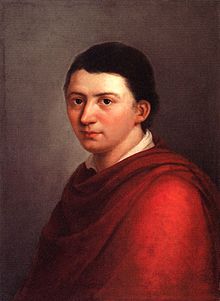Friedrich von Schlegel
| Friedrich Schlegel | |
|---|---|

Friedrich Schlegel in 1801
|
|
| Born | 10 March 1772 Hanover |
| Died |
12 January 1829 (aged 56) Dresden |
| Alma mater | University of Göttingen |
| Era | 19th-century philosophy |
| Region | Western Philosophy |
| School |
Jena Romanticism Post-Kantian transcendental idealism HistoricismRomantic linguistics |
|
Main interests
|
Philology, philosophy of history |
|
Notable ideas
|
Coining the term "historicism" (Historismus) |
|
Influences
|
|
|
Influenced
|
|
Karl Wilhelm Friedrich (after 1814: von) Schlegel (10 March 1772 – 12 January 1829), usually cited as Friedrich Schlegel, was a German poet, literary critic, philosopher, philologist and Indologist. With his older brother, August Wilhelm Schlegel, he was one of the main figures of the Jena romantics. He was a zealous promoter of the Romantic movement and inspired Samuel Taylor Coleridge, Adam Mickiewicz and Kazimierz Brodziński. Schlegel was a pioneer in Indo-European studies, comparative linguistics, in what became known as Grimm's law, and morphological typology. As a young man he was an atheist, a radical, and an individualist. Ten years later, the same Schlegel converted to Catholicism. Around 1810 he was a diplomat and journalist in the service of Clemens von Metternich, surrounded by monks and pious men of society.
Karl Friedrich von Schlegel was born on 10 March 1772 at Hanover, and his father was the Lutheran pastor Johann Adolf Schlegel in the Marktkirche. For two years he studied law at Göttingen and Leipzig, and met with Friedrich Schiller. In 1793 he devoted himself entirely to literary work. In 1796 he moved to Jena where his brother August lived and collaborated with Novalis, Ludwig Tieck, Fichte and Caroline Schelling, whom he married. Novalis and Schlegel had a famous conversation about German idealism. In 1797 he quarreled with Schiller, who did not like his polemic work. Schlegel published Die Griechen und Römer (The Greeks and Romans), which was followed by Geschichte der Poesie der Griechen und Römer (The History of the Poetry of the Greeks and Romans) (1798). Then he turned to Dante, Goethe and Shakespeare. In Jena he and his brother founded the Athenaeum, contributing fragments, aphorisms and essays in which the principles of the Romantic school are most definitely stated. They are now generally recognized as the deepest and most significant expressions of the subjective idealism of the early romanticists. After a controversy, Friedrich decided to move to Berlin. There he lived with Friedrich Schleiermacher and met Henriette Herz, Rahel Varnhagen, and his future wife Dorothea, a daughter of Moses Mendelssohn and the mother of Philipp Veit. In 1799 he published Lucinde, an eccentric and unfinished romance, which is interesting as an attempt to transfer to practical ethics the Romantic demand for complete individual freedom.Lucinde, in which he extolled the union of sensual and spiritual love as an allegory of the divine cosmic Eros, caused a great scandal by its manifest autobiographical character, and contributed to the failure of his academic career in Jena where he lectured as a Privatdozent in Transcendental philosophy. In September 1800 he met four times with Goethe. In 1801 he graduated in philosophy. In Alarcos, a tragedy (1802) in which, without much success, he combined romantic and classical elements.
...
Wikipedia
